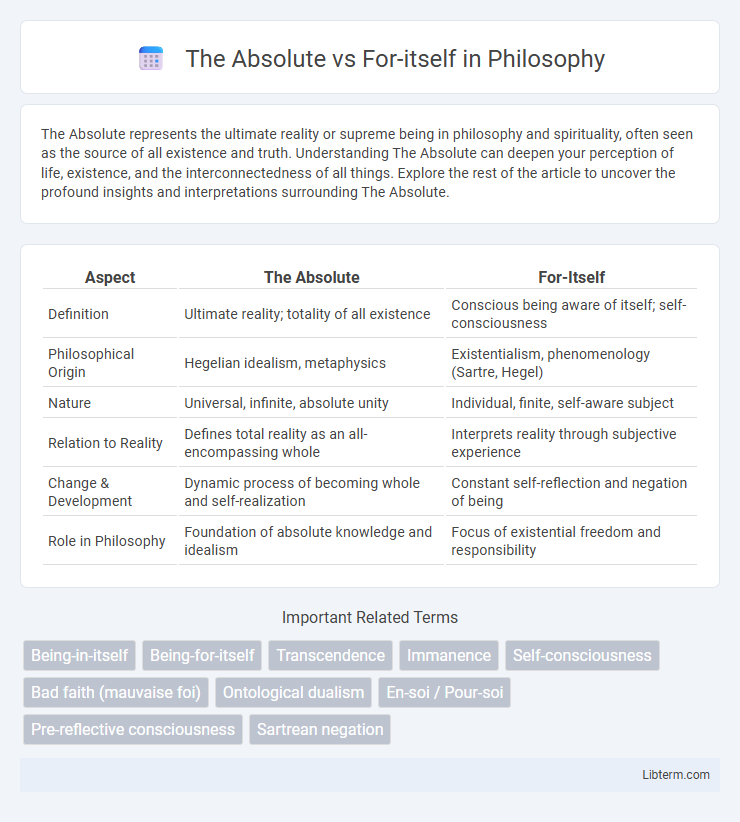The Absolute represents the ultimate reality or supreme being in philosophy and spirituality, often seen as the source of all existence and truth. Understanding The Absolute can deepen your perception of life, existence, and the interconnectedness of all things. Explore the rest of the article to uncover the profound insights and interpretations surrounding The Absolute.
Table of Comparison
| Aspect | The Absolute | For-Itself |
|---|---|---|
| Definition | Ultimate reality; totality of all existence | Conscious being aware of itself; self-consciousness |
| Philosophical Origin | Hegelian idealism, metaphysics | Existentialism, phenomenology (Sartre, Hegel) |
| Nature | Universal, infinite, absolute unity | Individual, finite, self-aware subject |
| Relation to Reality | Defines total reality as an all-encompassing whole | Interprets reality through subjective experience |
| Change & Development | Dynamic process of becoming whole and self-realization | Constant self-reflection and negation of being |
| Role in Philosophy | Foundation of absolute knowledge and idealism | Focus of existential freedom and responsibility |
Defining the Absolute: Philosophical Foundations
The Absolute, in philosophical foundations, represents an all-encompassing reality existing independently of subjective interpretation, often characterized as infinite and self-sufficient. In contrast, For-itself denotes a conscious being's self-awareness and negation of mere being, emphasizing existential freedom and subjectivity. Defining the Absolute involves understanding it as the foundational ground or ultimate essence beyond the contingent and temporal nature of For-itself.
Understanding the For-itself: Existentialist Perspectives
The For-itself represents conscious existence defined by self-awareness and freedom, contrasting with the Absolute's unified, impersonal totality in Hegelian philosophy. Existentialist perspectives, particularly those of Sartre, emphasize the For-itself's inherent nothingness and perpetual becoming, highlighting individual responsibility and subjective choice. This dynamic underscores the tension between essence and existence, as the For-itself continuously defines itself through actions within an otherwise indifferent universe.
Historical Evolution of the Absolute and For-itself
The historical evolution of the Absolute and For-itself centers on Hegelian dialectics, where the Absolute represents an all-encompassing ultimate reality while the For-itself signifies individual self-consciousness or subjective awareness. Philosophers like Hegel developed the concept of the Absolute as a dynamic totality evolving through stages of thesis, antithesis, and synthesis, encompassing both nature and spirit. The For-itself, rooted in existentialist thought, especially in Sartre's philosophy, emphasizes personal freedom and self-definition against the backdrop of the evolving Absolute, marking a shift from metaphysical totality to individual agency.
Ontological Distinctions: Being-in-itself vs Being-for-itself
The Absolute represents an unconditioned totality, embodying pure being without division, paralleled by being-in-itself's self-contained, inert existence. Being-for-itself introduces subjectivity and consciousness, characterized by self-awareness and the capacity for negation, distinguishing it ontologically from the static nature of being-in-itself. The ontological distinction hinges on consciousness's ability to transcend mere existence, situating being-for-itself as a dynamic process opposed to the Absolute's undifferentiated fullness.
Consciousness and the For-itself: Sartrean Insights
The Absolute represents an all-encompassing, unified reality, while the For-itself, central to Sartrean philosophy, embodies self-aware consciousness characterized by its capacity for negation and freedom. Sartre's notion of the For-itself emphasizes the continuous creation of self-identity through conscious choices, contrasting with the In-itself's static existence. This dynamic tension between consciousness and being underscores existential freedom and the inherent responsibility within the For-itself's lived experience.
The Role of Negation in For-itself
The Role of Negation in For-itself centers on the For-itself's inherent capacity to define itself through what it is not, distinguishing itself from the Absolute, which embodies pure being without distinction. Negation enables the For-itself to engage in self-reflection, creating a dynamic tension between being and non-being that drives consciousness and subjective experience. This process reveals the For-itself's existence as incomplete or lacking, motivating it to transcend mere presence by defining identity against absence or otherness.
The Absolute in Metaphysics: Unity and Totality
The Absolute in metaphysics represents the ultimate unity and totality of all existence, embodying an all-encompassing reality beyond individual distinctions. It is characterized by self-sufficiency and completeness, where all contradictions are resolved within its infinite whole. This concept contrasts with finitude and fragmentation, asserting that the Absolute is the foundational ground of being and absolute truth.
Freedom and Responsibility in the For-itself
The For-itself embodies consciousness characterized by radical freedom and the inherent responsibility to define its own essence through actions. Unlike the Absolute, which represents an unchanging totality, the For-itself experiences tension in making authentic choices, bearing full accountability for the consequences. This dynamic interplay between freedom and responsibility is central to existentialist philosophy, emphasizing individual self-creation and ethical commitment.
The Absolute and For-itself in Contemporary Thought
The Absolute in contemporary thought represents an all-encompassing reality or ultimate principle beyond subjective experience, often aligned with metaphysical totality or unity. The For-itself, rooted in existential philosophy, signifies consciousness characterized by self-awareness, intentionality, and freedom, emphasizing individual existence and subjectivity. Modern philosophical discourse explores the tension between these concepts by examining how the For-itself negotiates its autonomy within or against the encompassing nature of the Absolute.
Comparative Analysis: Bridging the Absolute and For-itself
The Absolute in Hegelian philosophy represents an all-encompassing, self-determined totality of reality, while the For-itself signifies individual consciousness characterized by self-awareness and negation. Comparative analysis reveals that the Absolute and the For-itself are dialectically interconnected, as the For-itself's self-consciousness progresses toward recognizing its unity within the Absolute. This bridging highlights the dynamic process of synthesis where subjective freedom and universal essence converge, forming the foundation of Hegel's dialectical method and metaphysical system.
The Absolute Infographic

 libterm.com
libterm.com